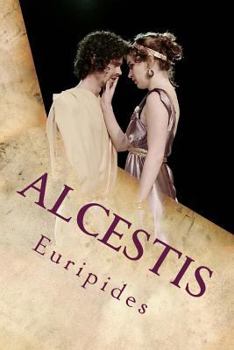Alcestis
Select Format
Select Condition 
Book Overview
Euripides? Alcestis?perhaps the most anthologized Attic drama--is an ideal text for students reading their first play in the original Greek. Literary commentaries and language aids in most editions... This description may be from another edition of this product.
Format:Paperback
Language:English
ISBN:1533000182
ISBN13:9781533000187
Release Date:April 2016
Publisher:Createspace Independent Publishing Platform
Length:64 Pages
Weight:0.23 lbs.
Dimensions:0.1" x 6.0" x 9.0"
Customer Reviews
5 ratings
Hughes versus Carson
Published by Thriftbooks.com User , 15 years ago
I read Carson's translation, then Hughes. In Carson, the man was unworthy of the woman, a little of a buffoon, spoiled and self-centered. In Hughes, he was pinioned by the gods exactly between intense love and inescapable duty, a tragic hero. Different translator choices, different tastes.
The closest thing we have to a Greek satyr play
Published by Thriftbooks.com User , 21 years ago
"Alcestis" is the oldest surviving play of Euripides, although he had been writing tragedies for almost twenty years when it was written. Apparently it ws the fourth play in a tetralogy, taking the place of the ribald satyr play which traditionally followed a series of three tragedies. Consequently, this play has more of a burlesque tone, best represented in the drunken speech of Heracles to the butler and his teasing of Admetus at the end. So while "Alcestis" is a tragedy, it does offer up an unusal happy ending. In Greek mythology Alcestis was the daughter of Pelias and wife of Admetus, an Argonaut and the king of Pherae. In Western literature Alcestis is the model wife, for when her husband is to die she alone agrees to die in his place. However, the key in this drama is how Admetus finds this sacrifice totally acceptable. Admetus is represented as a good and honorable man, but then his ethos is established in this play by the god Apollo in the opening scene, and even though it was written later it is hard not to remember the expose Euripides did on the god of truth in "Ion." Euripides adds a key twist in that Alcestis agrees to the sacrifice before she fully understands that her husband will suffer without her. She is brought back from the underworld by Heracles and restored to her relieved husband, but the play clearly characterizes Admetus as a selfish man and it is this view that other writers have imitated every since. The story of Alcestis has been addressed by more modern writers from Chaucer and Milton to Browning and Eliot. The sacrifice of Alcestis has also been the subject of several operas. "Alcestis" is not a first rate play by Euripides, but it does represent both his cynicism and his attempt to make the audience confront the problematic elements of its belief system. So while I would not teach "Alcestis" by itself, in conjunction with other play by Euripides, specifically "Ion," it can definitely have value in class.
A project uncompleted
Published by Thriftbooks.com User , 24 years ago
Ted Hughes'translation of Alcestis continues on a path he pursued for most of his later years: to resurrect "classic" poetry in a modern form. The translation flows eloquently, with the typical Hughes clipped verse. He seems desparate to make the text "speak" to modern readers, and (I think) especially to modern poets. Despite the obvious (and poignant) parallels of the storyline to Hughes' own life, I did not find his translation of Alcestis as arresting as his Oresteia trilogy (especially the moving "Agamemnon"). The main characters in Alcestis all come across as somewhat cold, and there is a distance between the major themes (sacrifice, renunciation, regret) and the language used. The famous (but somewhat enlarged in Hughes' version) sequence of a drunken Heracles seems discordant given the sparce tone of the rest of the translation.A fine (and uniquely personal) version, but one to be read along with older, more full treatments.
Hughes' Final Gift
Published by Thriftbooks.com User , 25 years ago
At the end of the last book that Ted Hughes has given us, the king's wife returns from the dead, after she has sacrificed her life for his. It is a celebratory end to a journey through grief and hell, and one can only hope that Hughes, at the end of his life, putting together "Birthday Letters", was consoled by the fact that his illness would soon reunite him with the woman whose legacy and ghost he would never shake. Profound, unsettling, thought-provoking; we should expect nothing less from one of the finest poets of the century.
Offer you this treat!
Published by Thriftbooks.com User , 26 years ago
Alcestis was the first Greek tragedy I read, and it is still the one I love most, though Ajax and both Iphigenias are tough competitors. Heracles, a.k.a. Hercules, accepts hospitality at a home where, unknown to him, the housewife, Alcestis, is being mourned. He drinks and raises hell (the pun will be noticed by he who reads the play!). Informed of the tragedy, much embarrassed, he decides to add a new task to his tight schedule: bringing back the lady. This is a tragedy that ends well. Actually, it runs well all the time, being one of the greatest creation of human imagination.






